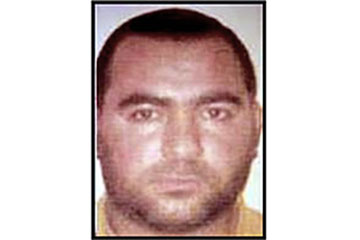
(3 of 3)
Baghdadi's expansion into Syria has rejuvenated a waning al-Qaeda, inspired new recruits and, with ISIS's dominance in the north, brought the organization the closest it has ever been to its goal of establishing a caliphate. That success may have made Baghdadi too arrogant for al-Qaeda's old guard, says Seth Jones, a counterinsurgency specialist at the Rand Corp., a security-policy think tank in Washington. "He is the naughty son, the one who keeps pushing the line. For the moment he still has a relationship with his parents in Pakistan, where al-Qaeda Central is based, but he is giving them a huge headache."
In May, Zawahiri was forced to publicly intervene in a spat between Baghdadi and his onetime deputy, Abu Muhammad al-Jawlani, head of the Syrian al-Qaeda affiliate al-Nusra Front, over Baghdadi's attempt to merge the two organizations. In a letter followed by an audio recording, Zawahiri abolished ISIS and ordered Baghdadi back to Iraq. Baghdadi didn't listen, snapping back in a terse audio recording that ISIS would stay intact. "I have to choose between the rule of God and the rule of Zawahiri, and I choose the rule of God," he said. Though the two groups maintain an uneasy alliance, almost all the foreign fighters and many of al-Nusra's top commanders defected to ISIS, pledging allegiance to Baghdadi.
The blatant indifference to instructions from al-Qaeda's top leader may presage more conflicts to come, says Jones. "The fact that Baghdadi has disregarded Zawahiri's instructions suggests that he may view himself as potentially more important than Zawahiri is." The rift has caught the attention of counterterrorism officials in the Obama Administration, who believe it could herald the splintering of the global jihad movement. But like an employer confronted with a talented but troublesome employee, Zawahiri recognizes that for the moment, at least, it's not practical to let Baghdadi go. In Syria, al-Qaeda has an opportunity to gain territory, win recruits and spread to neighboring countries. Disciplining Baghdadi could unravel it all, says Lewis of the Institute for the Study of War.
Not only that, it might render Baghdadi even more dangerous: unchecked by other central directives, he could lash out with high-profile terrorist attacks in neighboring Israel or Turkey, provoking powerful enemies that al-Qaeda has so far avoided attacking. Already he has mastered multiple streams of funding, from kidnapping for ransom and capturing oil fields to courting ideologically minded donors in the oil-rich Persian Gulf states, says Lewis, who believes that this has enabled Baghdadi to cut his financial ties to his mentors in Pakistan. "If al-Qaeda were sending funding, I wouldn't expect Baghdadi to push back so much. That's an indication that he can be financially independent."
A Global Gaze
The city of Raqqa offers the most concrete example of Baghdadi's views on governance. Captured by the rebels on March 5, the city was soon taken over by ISIS, which quickly set up Islamic courts and controlled the distribution of humanitarian aid. ISIS has tapped oil wells and captured refineries, handing out fuel to residents and using it to keep electricity supplied to the city. The group also set up a school in the city. It's an effective hearts-and-minds campaign, designed to prove that ISIS can govern as well as it can fight.
But those carrots come with sticks. Billboards promoting Islamic law and the veil for women have blossomed throughout the city. Roving bands of ISIS police pluck cigarettes from the lips of smokers and tear from rearview mirrors the dangling talismans traditionally used to ward off the evil eye — an affront to the true Islam, say the enforcers. Local activists and journalists who speak out against ISIS's draconian rules are tried in Islamic courts for apostasy. Others simply disappear.
Baghdadi's ambition for an Islamic state is openly stated. During Ramadan celebrations in Raqqa in August, ISIS displayed a map that showed a borderless country stretching from the edge of Iran to the southern tip of the Arabian Peninsula and across North Africa — a near re-creation of the 8th century Abbasid Caliphate, the first Islamic empire. The fact that Baghdadi already has a foothold in Raqqa, one of the capitals of Islam's golden age, has inspired a millenarian fervor among his followers, and strengthened his claim to prominence, says a Western aid worker based in Turkey who has close dealings with ISIS representatives. "At this point Baghdadi is saying, 'We are the real jihadis, we have actually won territory, and we are closer to having a caliphate than any other al-Qaeda group before.'"
ISIS, with its estimated 5,000 to 6,000 fighters, is significantly smaller than many of the other major fighting groups in Syria today. But most of ISIS's men have fought in other wars, from Afghanistan to Iraq and Libya. And it can direct and fund operations from Syria to Iraq, says Lewis. "Its military campaigns are very well crafted. I see border crossings taken purposefully and oil fields taken and exploited for financial gain. These are thoughtful terrain objectives indicating a long-term vision of territorial gain," she says. "This is not the enemy we saw in the Iraq War, which simply massed explosive attacks. The organization has evolved." And the man who made all that possible is Osama bin Laden's true heir.
—with reporting by Michael Crowley / Washington, Piotr Zalewski / Istanbul and Rami Aysha / Beirut
